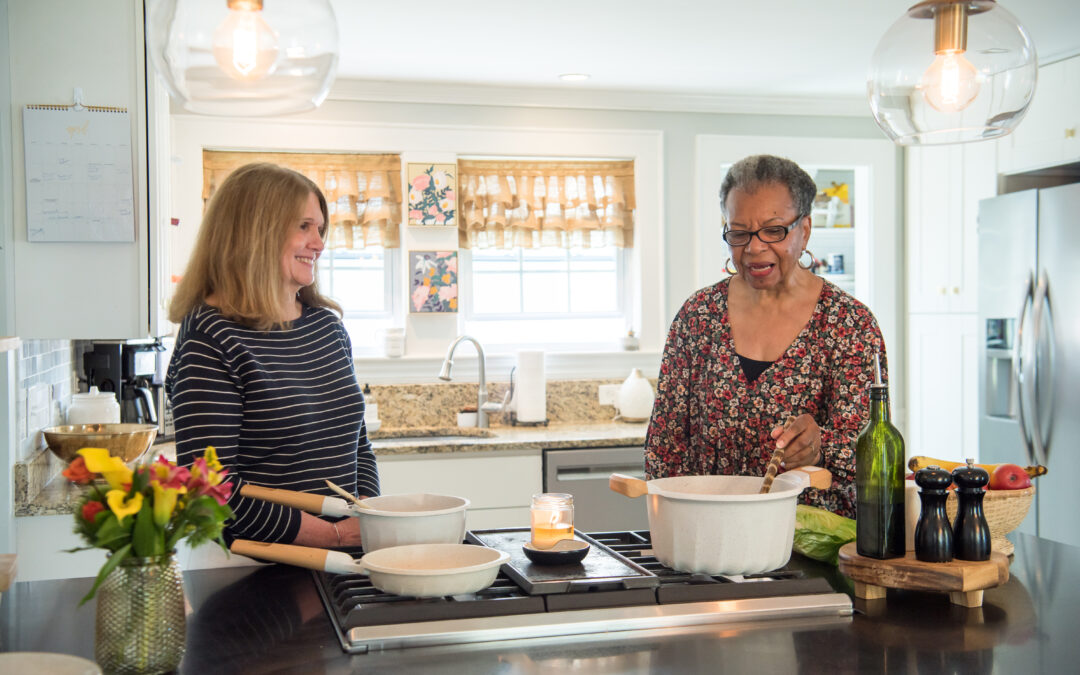The Seniors Helping Seniors® family loves seeing our care receivers enjoy the best parts of each season. With summer fast approaching in the Northeast, it will soon be time to break out the shorts, light the citronella candle, and dust off the patio table for the season’s first outdoor feast!
It can be tempting to indulge throughout the summer months. With family cookouts, vacations, and the urge to spend time enjoying the outdoors in lieu of the kitchen, we often opt for quick, not so healthy choices. A nutritious, balanced diet, however, is important for active seniors all year long.
The good news is, continuing to eat right over the summer months doesn’t have to be complicated. Soak in these four Seniors Helping Seniors® tips for a summer of healthy – and delicious – eating!
Keep It Balanced
Making good decisions isn’t hard once you know what to choose. Let’s look at the layers of the food pyramid and determine the best foods to reach for and which to skip.
Grains
The foundation of the food pyramid is the grain group, which encompasses things like rice, pasta, bread, and oats. When stocking the cabinets, whole grains are best. Whole grains are made using the entire grain kernel and, therefore, are good sources of dietary fiber, minerals, and Vitamin B.
Fruits and Vegetables
We all know fruits and veggies provide plenty of dietary value, but which are the most nutritious options? Look for produce that is red, orange, purple, and green, as these fruits and veggies contain vitamins and minerals that are especially important to senior health.
P.S. – The Northeast is known for its abundant fruit and vegetable production, so check the local section of the grocery store or visit community produce stands for some excellent options!
Dairy
When choosing milk, yogurt, and cheese products, go with low-fat or fat-free options. Calcium is the major benefit in this group, but dairy products also provide phosphorus, Vitamins A and D, B12, potassium, and more.
Protein
Protein covers a wide variety of foods, including meat, poultry, eggs, seafood, and legumes (like beans and lentils). Look for meat and poultry that’s lean or low-fat and seafood that’s high in omega-3s and has a low mercury count. For a vegetarian meal, substitute legumes as a tasty and nutritious option.
It’s important to mix it up when it comes to protein. Many people eat plenty of meat and poultry, but often skimp on fish and legumes. However, each category has specific vitamins and nutrients that are key to a balanced diet.
Advantages of Sensible Eating
When a variety of nutritious foods are incorporated into a balanced diet, the mind and body will benefit in spades! For example, healthy eating helps:
- Reduce cholesterol
- Lower risk of heart disease, cancer, and diabetes
- Promote proper bowel function
- Support a healthy nervous system
- Boost immunity and prevent infection
- Encourage healthy eyes, skin, and gums
- Maintain strong bones and teeth
- Improve concentration and attention span
- Increase energy and mental clarity
Preparation Is Key
How food is cooked contributes to a healthy diet as well. During the summer months, grilling is an excellent option and produces flavorful dishes. Better yet, it’s a wonderful time to gather with loved ones and your Seniors Helping Seniors® companion to enjoy the outdoors and fellowship while dinner is cooking!
Grilled to Perfection
Cooking on the grill is easy and requires little preparation. Simply apply your favorite seasoning combination or marinade and get grilling! As the food cooks, excess fat and oil drip away, leaving a wholesome and delicious dinner.
Try these tips and tricks from Seniors Helping Seniors® in-home services to make grilling a breeze:
- Invest in a meat thermometer and always ensure poultry is cooked to an internal temperature of 165°F and pork to 145°F.
- Cook veggies in foil packets with seasoning and a little oil (extra virgin olive oil or canola are best). Ensure the packet is sealed at the top and place it directly on the grates until the veggies are tender.
- Craving something sweet? For dessert, try grilling pineapple, peach, or watermelon slices for an after-dinner treat!
One of the best things about this method is there’s minimal clean-up required, leaving more time to spend enjoying your dinner companions!
Practice Proper Portion Control
Consuming the right amounts of each food group is important as well. When making a plate, follow these Seniors Helping Seniors® suggestions for a balanced meal:
- Envision a vertical line directly down the middle of the plate
- On the right, add half whole grains and half lean protein
- Fill the left side with fruits and vegetables (heavier on the veggies)
- Eat dairy in moderation
Now, all that’s left is to choose a healthy option to wash it all down…
Drink Up!
Staying hydrated is key, especially when summer heat kicks into high gear! Water is an essential nutrient and should be the majority of what’s consumed throughout the day. Try fruit-infused water for a twist on the traditional or sparkling water for something bubbly. Tea and coffee are good options as well and provide several health benefits of their own.
Avoid sugary drinks or those with high salt content and stay away from consuming alcohol in excess. These actually contribute to dehydration and a number of other issues.
Who’s ready to welcome summer?! With these tips from Seniors Helping Seniors® in-home care services, you or your senior loved one will find plenty of health-conscious ways to enjoy the tastes of the season!

